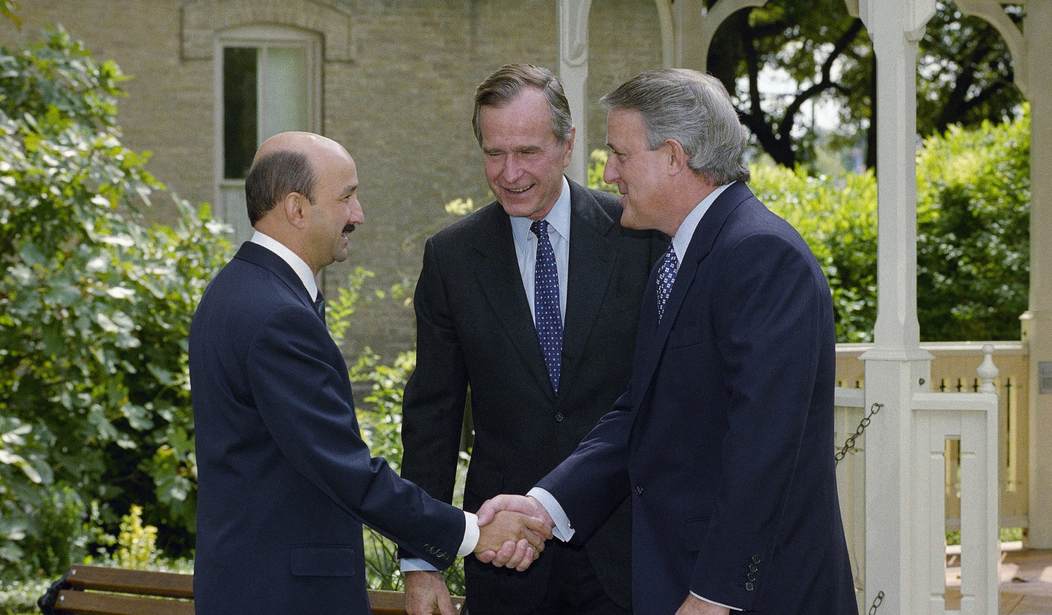WASHINGTON – Former Canadian Prime Minister Brian Mulroney told Congress on Tuesday that NAFTA has fulfilled President George H.W. Bush’s vision for Mexico, while repeatedly stressing the importance of maintaining the trade agreement that President Trump has threatened to exit.
Speaking before the Senate Foreign Relations Committee, Mulroney told lawmakers about a private conversation he had with Bush in the Oval Office in the early 1990s, when NAFTA was being finalized.
He said that Bush would have considered NAFTA a success if, in 25 years, it created enough prosperity in Mexico that the number of Mexicans returning to Mexico exceeded the number of Mexicans fleeing to the United States. That milestone was passed in 2015.
According to the Pew Research Center, between 2009 and 2014 more Mexican immigrants returned to their home country from the U.S. than those who migrated into the United States.
Pew cited the 2014 Mexican National Survey of Demographic Dynamics, which showed that in that five-year time span about a million Mexicans and their families left the U.S. for Mexico. In that same period, about 870,000 Mexican nationals left Mexico for the U.S., according to U.S. census data.
“You’re dealing with two problems at once,” Mulroney said of NAFTA. “The prosperity of a great trading country like Mexico, the immigration challenge in the United States — all done in a highly civilized and productive manner.”
Canada and Mexico are the second- and third-largest trading partners for the U.S., respectively, and the U.S.-Mexico relationship represents an annual trading relationship that exceeds $600 billion and supports 5 million American jobs. The United States, Mexico and Canada remain divided over modernizing the nearly 25-year-old trade agreement.
During the hearing, Sen. Bob Menendez (D-N.J.) said that it is not in America’s best interests for Trump to routinely “denigrate entire countries and their citizens,” particularly Mexico. He said that Trump’s criticisms put the U.S. at a disadvantage in attempting to position “productive partnerships that benefit all Americans.”
“The president remains obsessed with a campaign slogan that implies the United States is happy to go it alone, questioning longstanding treaties and positions of international leadership,” Menendez said.
Trump has suggested that he will use the NAFTA renegotiation to get Mexico to pay for his now estimated $25 billion border wall promised during the 2016 campaign. Mexico’s former Secretary of Commerce and Industry Jaime Serra Puche was asked by a lawmaker if, were he serving in his old role, he be willing to negotiate that aspect of a potential deal.
Puche jokingly deflected the question to a Mexican ambassador and then flatly declared “no,” he would not be willing to negotiate for Mexico to build the border wall. He said that while he understands the need for an intelligent, efficient border security system, there is no need for a “protectionist border wall.” He said such a structure will have a social cost in terms of limiting trade access between the countries.
Menendez cited a 2017 Gallup poll showing that Canadian and Mexican approval ratings for U.S. leadership declined between 2016 and 2017. The Canadian approval rating fell from 60 percent to 20 percent, and Mexico’s rating fell to 16 percent, the lowest mark in 25 years.
“The public opinion in Mexico, the public opinion in Canada, about the confidence in the United States, has diminished, and that should be a matter of concern for all of us,” Sen. Ben Cardin (D-Md.) said.
The Maryland Democrat added that he visited Mexico recently and spoke with members of the Mexican senate.
“They weren’t very diplomatic in the manner in which they talked about the way President Trump has talked about immigration and the wall and how offensive that is to the people of Mexico,” Cardin said.
Tuesday’s discussion also touched on Trump’s decision to walk away from renegotiation with 11 other countries over the Trans-Pacific Partnership, which includes Mexico and Canada. Those countries are expected to sign a new agreement in March.
The current TPP represents about 40 percent of the world’s GDP, and Mulroney said he anticipates it being a “successful initiative.” However, “without America, it’s not as great as it could be, so my hope is that eventually America will sign up,” he added.









Join the conversation as a VIP Member